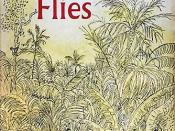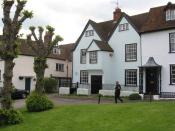Human Nature
Many people have pondered the question "what is basic human nature?" Many ancient philosophers have written on this topic, and their ideas differed greatly. Debate on which view of human nature is correct has raged for centuries, with no winner so far. Human nature is such a sensitive issue because it helps to define morality and savagery. William Golding's story Lord of the flies, has added much to the ongoing debate over human nature, because it speaks a lot on the topic of human nature. Reading Lord of the Flies, one gets an impression of Golding's pessimistic view on human nature, that humankind is inherently evil. I think that way as well for it is so simple to observe in the novel how easily society can collapse and how self-destructive human nature can be once the constrains of civilization are gone. To my mind Golding is doing his best to illustrate that theme in the novel.
At four major points throughout Lord of the Flies, Golding has the characters become gradually more and more evil. The pig's death indicates the appearance of evil on the island. Meat is not necessary for the boys' survival, yet Jack and his hunters become obsessed with killing pigs. They enjoy having the power of life and death over another living creature and sadistically torture the sow while they slaughter her. The sow symbolizes motherhood and nurturing, the boys' murder of her signifies their gaining of savage and barbaric characteristics and their lessening concern for life. Jack rubs the blood over Maurice's cheeks, while Roger laughs that the fatal blow against the sow was up her ass. The boys cut off the pig's head and leave it on a stick as a gift for the beast at the mountaintop. Jack's feeling toward...


